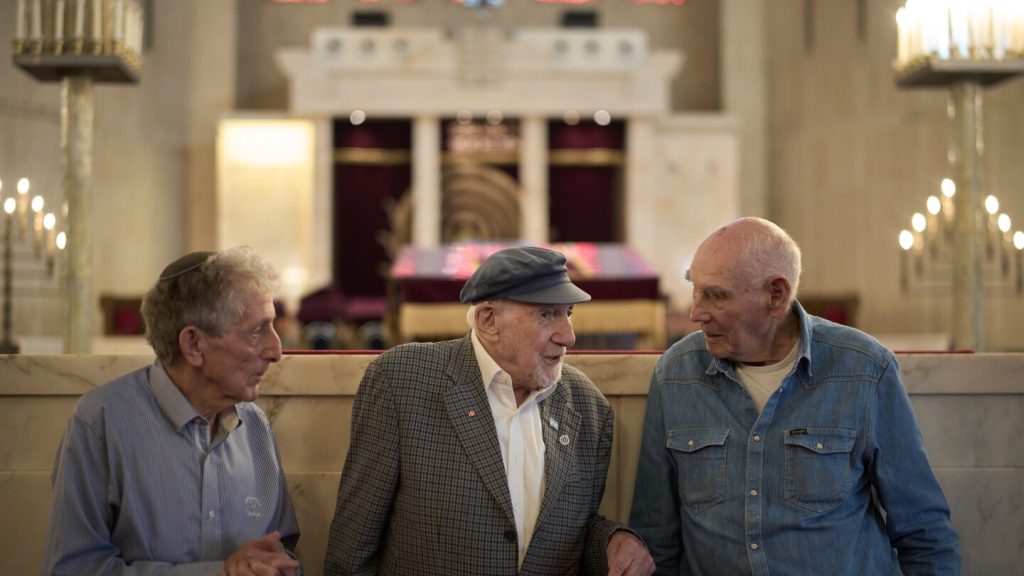Listen to the article
As the world marks the 87th anniversary of Kristallnacht, Holocaust survivors warn that rising antisemitism evokes disturbing parallels to 1938 Germany. Walter Bingham, now 101, remembers with vivid clarity the morning after the “Night of Broken Glass” when he walked to school in Mannheim to find his synagogue reduced to smoldering ruins.
“We live in an era equivalent to 1938, where synagogues are burned, and people in the street are attacked,” said Bingham, reflecting on recent incidents targeting Jewish institutions worldwide.
Kristallnacht, which occurred on November 9, 1938, marked a pivotal escalation in Nazi persecution of Jews. During the orchestrated violence, at least 91 people were killed, 7,500 Jewish businesses vandalized, and more than 1,400 synagogues set ablaze, according to Israel’s Yad Vashem Holocaust memorial. Up to 30,000 Jewish men were arrested and sent to concentration camps, with hundreds dying from mistreatment.
For Bingham and other survivors, recent attacks against synagogues in Australia and against Israeli sports teams in Europe have triggered painful memories. They represent a dwindling generation of witnesses – of approximately 200,000 remaining Holocaust survivors, 70 percent are expected to pass away within the next decade.
In Jerusalem’s Great Synagogue, where light streams through ornate stained-glass windows, three Kristallnacht survivors shared their experiences with The Associated Press. The survivors, who regularly give testimony at the annual March of the Living at Auschwitz, chose the location for its symbolism of Jewish resilience.
Bingham recounted watching firefighters allowing the synagogue to burn while protecting neighboring buildings. Months after Kristallnacht, he escaped to England on a Kindertransport – the British rescue mission that saved nearly 10,000 children from Nazi-occupied Europe. His father died in the Warsaw Ghetto, and he never saw his mother again.
George Shefi, 94, remembers being confined to his Berlin home for three days during Kristallnacht as a second-grader. When finally allowed outside, he witnessed crowds intimidating those cleaning up the destruction. Like Bingham, Shefi escaped on a Kindertransport and never saw his mother again – she perished at Auschwitz.
Paul Alexander, 87, was less than a year old during Kristallnacht. His parents sent him to England on a Kindertransport just weeks before World War II began. “It was because of Kristallnacht that the Jewish people in England decided that they must save Jews from Germany and get them out as quickly as possible,” Alexander explained. He was among the few children later reunited with their parents.
According to an annual report from Tel Aviv University, antisemitic attacks have increased significantly since the Israel-Hamas war began, though numbers have slightly declined from the peak following the October 7, 2023, Hamas attack against Israel.
Despite these troubling trends, Bingham notes a crucial difference between the 1930s and today. “In those days, the Jewish mentality was apologetic,” he said. “Today, we have, thank God, the state of Israel, a very strong state. And whereas antisemitism is still on the increase, the one thing that will not happen would be a Holocaust, because the state will see to it.”
Bingham’s remarkable life journey took him from Nazi Germany to serving in the British military as an ambulance driver and intelligence officer who interrogated high-ranking Nazi leaders. Today, he holds the Guinness World Record for oldest working journalist, contributing to Israeli news websites and radio since 2021.
All three survivors emphasize education as essential in combating intolerance. Shefi has spoken to over 12,000 students in Germany and elsewhere, conveying that while younger generations aren’t responsible for their grandparents’ actions, they bear responsibility for preventing history from repeating itself.
“Antisemitism, I don’t think, will ever fully disappear because it’s the panacea for all ills of the world,” Bingham observed. But he believes in directly confronting hatred: “What we have to do in addition to education is to actually, literally, fight. If we see it, we have to hit back.”
As firsthand witnesses to one of history’s darkest chapters grow fewer, their testimonies become increasingly precious – urgent reminders of where unchecked hatred can lead and the importance of vigilance against its resurgence.
Fact Checker
Verify the accuracy of this article using The Disinformation Commission analysis and real-time sources.




8 Comments
It’s deeply concerning to see the rise in antisemitism globally. The survivors’ accounts are a sobering reminder of the devastation that can occur when hate and intolerance are allowed to flourish. We must learn from history and work tirelessly to prevent such atrocities from happening again.
Well said. Vigilance and collective action are crucial to ensuring that the lessons of Kristallnacht are not forgotten and that we build a more just, equitable, and inclusive world.
The resilience and courage of the Kristallnacht survivors is truly inspiring. Their stories serve as a powerful testament to the human spirit and the importance of learning from the past.
Absolutely. We must honor their experiences by remaining committed to combating antisemitism and all forms of discrimination wherever they arise.
As a mining and commodities enthusiast, I’m saddened to see this disturbing news. The lessons of Kristallnacht should remind us all of the importance of protecting minority communities and upholding human rights.
It’s deeply disturbing to see the parallels between the antisemitism of today and the horrors of Kristallnacht. We must remain vigilant and stand united against all forms of hate and intolerance.
Agreed. The survivors’ firsthand accounts are a sobering reminder of the dangers of unchecked prejudice. Education and empathy are crucial to preventing such tragedies from recurring.
As a mining and energy professional, I’m troubled by the parallels between the current rise in antisemitism and the horrors of Kristallnacht. We must remain committed to combating all forms of discrimination and standing up for the rights and dignity of all people.